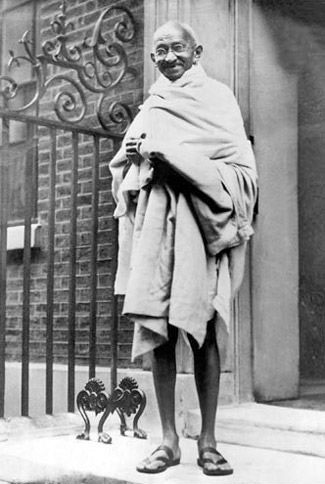2nd October 1947...The Last Birthday Of Mahatma Gandhi

On hearing of the possibility of India being made independent, Hindu-Muslim communal riots erupted around the country. Gandhi had never subscribed to the two nation theory nor did he agree to it. But the Congress leaders and the public, tired of the communal tensions in the country, considered partition to be the lesser of the two evils. Gandhi had to finally give in to popular sentiment.
The weapons of truth and non-violence used by the Congress, and by default by the people, to achieve independence, were no longer considered adequate either by the same leaders of the Congress (who were in the forefront of the non-violent movement) or even the public. The views and the role of the vocal society on issues of communal harmony, khadi, village industries, Urdu, devnagari script, use of Hindustani (as against pure Sanskritised Hindi) and revival of Indian languages were very different. They considered Gandhi as an obstruction to achieve their ends.
...The differences of opinion and the circumstances of the country at that time led to Gandhiji feeling alone and isolated. Gandhi’s dejection was palpable. He sounded distraught. Death was very much on his mind. He used to pray that either the almighty give him the strength to change all that was happening and if not, to give him death. In this kind of milieu, Gandhi’s 78th birthday was approaching on 2 Oct 1947. This would prove to be his last birthday to be celebrated. All those around him had come to offer their good wishes. One such visitor jokingly commented, “Bapuji, on our birthdays we touch the feet of others and on your birthday too we have to touch your feet, how fair is that?” Gandhiji grinned and said, “The ways of mahatmas are always different. That is not my fault. You people have wrongly declared me a mahatma, so now bear the consequences.”
The weapons of truth and non-violence used by the Congress, and by default by the people, to achieve independence, were no longer considered adequate either by the same leaders of the Congress (who were in the forefront of the non-violent movement) or even the public. The views and the role of the vocal society on issues of communal harmony, khadi, village industries, Urdu, devnagari script, use of Hindustani (as against pure Sanskritised Hindi) and revival of Indian languages were very different. They considered Gandhi as an obstruction to achieve their ends.
...The differences of opinion and the circumstances of the country at that time led to Gandhiji feeling alone and isolated. Gandhi’s dejection was palpable. He sounded distraught. Death was very much on his mind. He used to pray that either the almighty give him the strength to change all that was happening and if not, to give him death. In this kind of milieu, Gandhi’s 78th birthday was approaching on 2 Oct 1947. This would prove to be his last birthday to be celebrated. All those around him had come to offer their good wishes. One such visitor jokingly commented, “Bapuji, on our birthdays we touch the feet of others and on your birthday too we have to touch your feet, how fair is that?” Gandhiji grinned and said, “The ways of mahatmas are always different. That is not my fault. You people have wrongly declared me a mahatma, so now bear the consequences.”